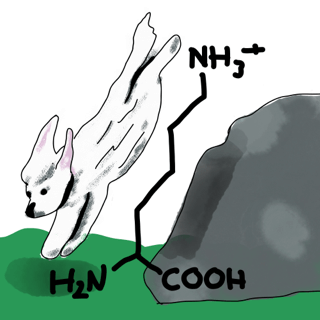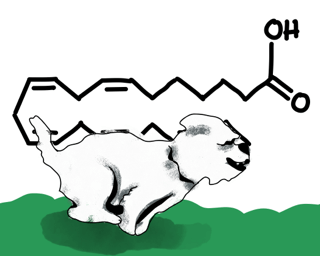

As your dog matures, his body functions change. He might have decreased immune-system function, deterioration of skin and coat quality, and more frequent intestinal problems. So it makes sense that what a mature dog eats might also need to change.
Throughout a dog's life, a process called peroxidation occurs. This is a normal process the body uses to destroy cells that outlive their usefulness and to kill germs and parasites, but this process also can destroy or damage healthy cells. As a dog ages, the damage caused by peroxidation accumulates and, in turn, increases the risk of certain problems such as infections.
Antioxidants are naturally occurring components in the body (but also can be acquired through diet). They help maintain overall health by neutralizing the peroxidation process of cellular molecules.
Research sponsored by IAMS™ found that dogs fed a diet rich in antioxidants such as vitamin E had improved immune responses and vaccine recognition. This might be especially important for mature/senior dogs, because IAMS research has found that, as dogs age, immune responses can decrease.
Eating a complete and balanced diet with omega-3 fatty acids, such as those found in vitamin-rich fish oils, also helps rejuvenate dry skin and develop a healthy, lustrous coat.
Aging dogs might have higher numbers of unfavorable bacteria and lower numbers of beneficial bacteria in their intestines, which can result in clinical signs of gastrointestinal problems (such as diarrhea). A diet with a moderately fermentable fiber source such as beet pulp can help maintain intestinal health. Beet pulp provides energy for the cells lining the intestine and promotes proper stool formation.
Different dogs show signs of aging at different times, and much of this variation is associated with size. Larger dogs generally appear mature/senior sooner than smaller dogs. The table below can show you when your dog should start a mature diet with a food such as IAMS ProActive Health™ Mature Adult.
Dog Weight and Transition to Mature/Senior Foods
| Weight Range | Age to Begin Transition |
|---|---|
| More than 90 lbs | 5 years |
| 51 to 90 lbs | 6 years |
| 21 to 50 lbs | 7 years |
| Up to 20 lbs | 7 years |


Providing your dog with a balanced diet of nutritious dog food will ensure they get adequate amounts of protein, fat and fiber. All three are essential to your dog’s health and happiness — and all three can be found in every IAMS™ product we produce. Learn more about how these three vital elements can support your dog’s whole-body health.

Protein Protein helps keep your dog’s muscles strong.
Protein helps keep your dog’s muscles strong. It also provides the amino acids necessary to build and repair proteins in their body. Many of these amino acids must be acquired through a dog’s diet.
Recipes contain animal-based proteins that provide the essential amino acids dogs need. Plus, we conduct special refining and quality assurance tests to ensure we only use high-quality, highly digestible protein sources for increased digestibility.

Fat gives your dog energy and helps nourish their skin and coat.
Fat provides energy. Your dog needs two types of fatty acids: omega-6 andomega-3 fatty acids. Omega-6 fatty acids are found in chicken fat and corn.Omega-3 fatty acids are found in ingredients such as canola, fish meal or oil, andflax. Both types help nourish and support your dog’s skin and coat.
Fiber and prebiotics help support your dog’s digestion.
IAMS™ dog food recipes feature a tailored blend of natural fiber from ingredients like beet pulp, as well as prebiotics to help support your dog’s digestion. Research has shown that moderately fermentable fiber, such as beet pulp, enhances intestinal health.
Feeding your dog a balanced diet that contains the right amounts of protein, fats and fiber is one of the most important ways you can care for and nourish them. To see the di!erence a healthy diet can make in your dog, feed them an IAMS recipe that’s tailored to their unique dietary needs, such as their size, age and breed. Are you ready to See the Wow?